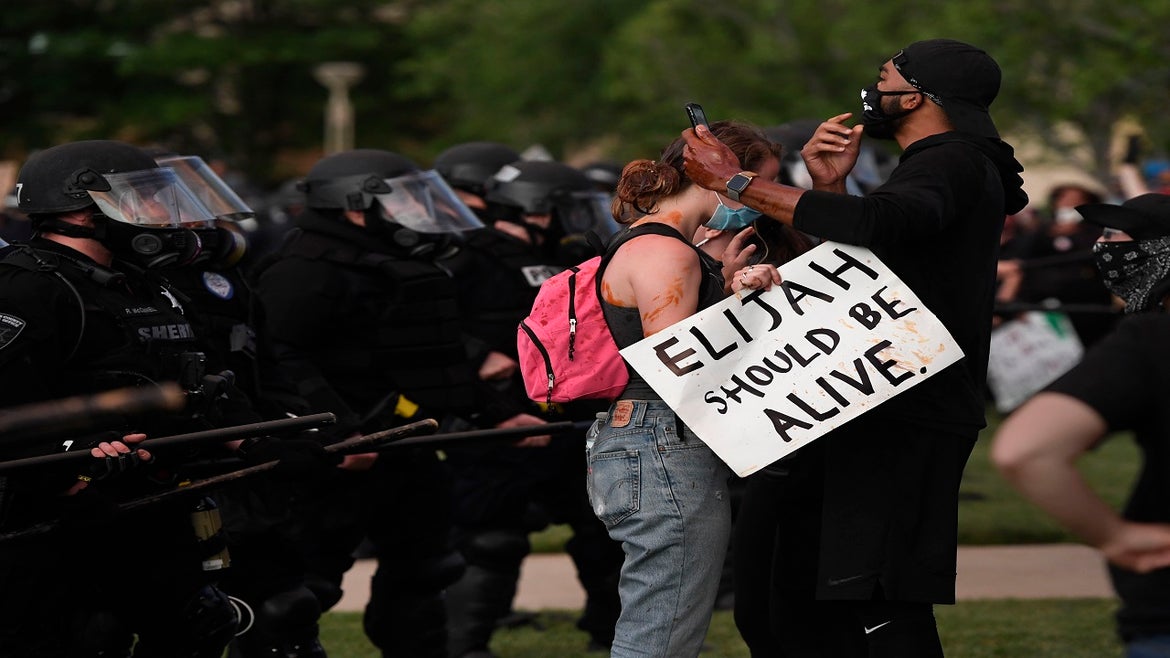The 23-year-old massage therapist died after being placed in a chokehold and injected with a powerful sedative, authorities said.
Three police officers and two paramedics have been charged with manslaughter in the death of 23-year-old Elijah McClain, a Black man who was placed in a chokehold and injected with a large dose of a strong sedative during an arrest in 2019, the Colorado attorney general announced Wednesday.
McClain, a massage therapist described by his family as an artistic and gentle soul, died after being confronted by Aurora police as he walked home from buying an iced tea. His pleas of "I'm just different" were captured on law enforcement body camera video and were posted on protest signs and spoken by celebrities during nationwide demonstrations following his death.
State Attorney General Phil Weiser said Wednesday a grand jury had issued a 32-count indictment, charging Aurora officers Randy Roedema, Nathan Woodyard and Jason Rosenblatt and fire department paramedic Jeremy Cooper and fire Lt. Peter Cichuniec on charges of manslaughter and criminally negligent homicide.
Roedema and Rosenblatt were also charged with second-degree assault with intent to cause bodily injury and one count of a crime of violence related to the assault charge. Cooper and Cichuniec also face three counts of second-degree assault, Weiser said at a news conference.
“Our goal is to seek justice for Elijah McClain, for his family and his friends,” Weiser said in brief remarks. He did not take questions from reporters.
“He was a son, a nephew, a brother, a friend. When he died, he was only 23 years old,” Weiser said. “He had his whole life ahead of him.”
Elijah's mother, Sheneen McClain, “is overwhelmed emotionally by this news and appreciates the hard work of Phil Weiser and the rest of his team. There is not a day that goes by that she does not think of her son Elijah,” said her lawyer, Qusair Mohamedbhai, in a statement.
The Aurora Police Association said "our officers did nothing wrong. McClain died due to a combination of exertion due to his decision to violently resist arrest and a preexisting heart condition," the union said in a statement. "He was alive and talking when the officers turned him over to EMS. There is no evidence that our officers caused his death."
Gov. Jared Polis ordered Weiser to open a new criminal investigation after a local prosecutor found in 2019 that charges could not be filed because an autopsy failed to determine how McClain died.
McClain's death prompted other reviews, including an investigation by the city of Aurora into its police department. The city's highly critical review did not provide justification for the officers to stop McClain. The cops were responding to a 911 call about a man acting suspicious, authorities said.
Police body camera footage of the incident showed an officer approaching McClain and saying, “I have a right to stop you because you’re being suspicious.”
As the officers restrain him, McClain asked them to let him go, saying, “You guys started to arrest me, and I was stopping my music to listen.”
The police officers then grappled with McClain and one could be heard saying McClain had grabbed another cop's weapon, according to body cam audio.
McClain tries to explain and sometimes cries out or sobs. He says he can’t breathe and was just on his way home.
“I’m just different. I’m just different, that’s all. That’s all I was doing. I’m so sorry. I have no gun. I don’t do that stuff. I don’t do any fighting. Why were you attacking me? I don’t do guns. I don’t even kill flies,” McClain is heard saying.
After a chokehold is applied, McClain passed out, authorities said. Paramedics who arrived injected him with ketamine, a powerful sedative.
According to a federal lawsuit filed by McClain’s family, he stopped breathing within five minutes. He was later declared brain dead and removed from life support.
The carotid chokehold, in which arteries carrying oxygen to the brain are compressed, resulting in a person losing consciousness, has since been banned in Colorado.
In a statement released to CBS Denver, the Aurora Police Association said "our officers did nothing wrong."
"McClain died due to a combination of exertion due to his decision to violently resist arrest and a preexisting heart condition," the statement said. "He was alive and talking when the officers turned him over to EMS. There is no evidence that our officers caused his death."






